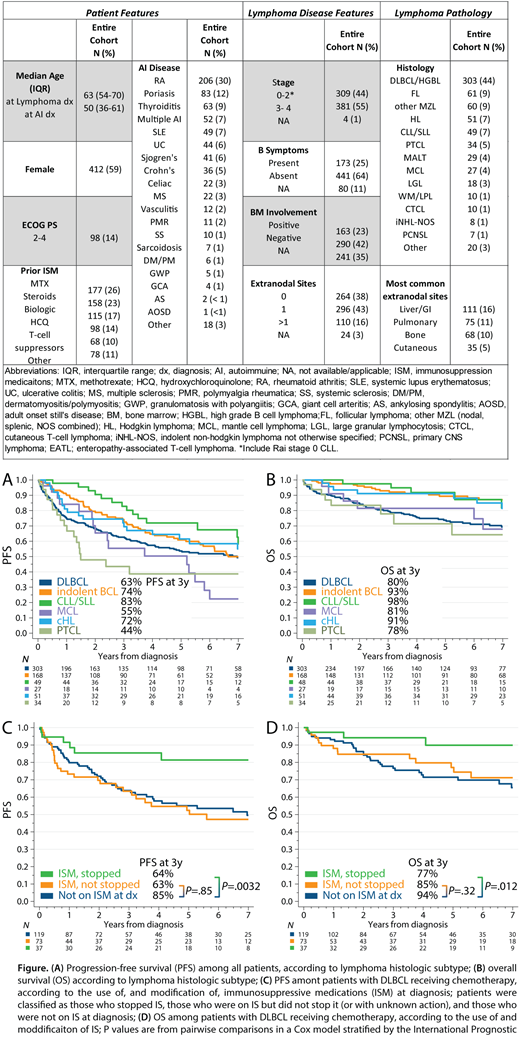Abstract
Introduction: While an association between AI diseases and the development of lymphoma (LYM) is known, the impact of AI diseases on patient (pt) outcome across varying LYM subtypes, including the role of immunosuppressive medications (ISM), is not well understood.
Methods: We conducted a large, multicenter, RWE retrospective analysis of adult pts with a diagnosis (dx) of lymphoma (LYM) between 1/2000 and 12/2020 and a pre-existing AI disease (see full list AI in Table 1). We examined baseline clinical features at LYM diagnosis, underlying AI disease characteristics, type/duration of ISM, LYM therapy received and survival outcomes. Multinomial regression models adjusted for age and sex identified associations between LYM subtypes, AI diseases, and ISM exposure, and were reported as relative risk ratio (RRR). Survival rates were estimated by Kaplan-Meier. Univariate associations of baseline factors with survival in cases with non-missing data were examined by Cox model and stratified by International Prognostic Index (IPI).
Results: In total, 785 pts were identified across 14 North American institutions, of which 694 pts with complete data were included in the final analysis. Rheumatoid arthritis was the most common AI disease (30%) (Table 1). Diffuse large B-cell lymphoma (DLBCL) was the most common histologic subtype (n=303, 44%), and it was the most prevalent histology for nearly every AI disease. The median duration between AI disease and LYM diagnosis was 108 months (mo) (1-816 mo). Several associations were found between specific AI diseases and LYM subtypes, including: Hashimoto's thyroiditis with marginal zone lymphoma (MZL, RRR 2.78 (95% CI 1.14-6.78, P=0.024), Waldenstrom's macroglobulinemia (RRR 7.12 (95% CI 1.07-47.3, P=0.031), and follicular lymphoma (RRR, 2.71, 95% CI 1.01-7.24, P=0.047); Polymyalgia rheumatica with CLL/SLL (RRR 21.27 (95% CI 4.57-98.96), P=0.0001) and MZL (RRR 6.62 (95% CI 1.38-31.80), P=0.018); Psoriasis with peripheral T-cell lymphoma (PTCL, RRR 3.85 (95% CI 1.21-12.22), P=0.022); and Inflammatory bowel disease with CLL/SLL (HR 4.60 (95% CI 1.72-12.34), P=0.002).
Overall, 402 (58%) pts had ISM exposure prior to LYM dx, with 279 (40%) pts on active ISM at time of LYM dx. The most commonly used ISM agent was methotrexate (26%); the median duration of ISM prior to LYM diagnosis was 60 mo (1-480). Compared with DLBCL pts, those diagnosed with PTCLs were more likely to have had exposure to TNF-α inhibitors (RR 1.89, 95% CI 1.23-2.89, P=0.004) or apremilast, a phosphodiesterase-4 inhibitor (RR 19.2, 95% CI 2.6-149.9, P=0.005). Rituximab +/- chemotherapy was used as frontline therapy in the majority of B-cell LYM pts, including 90% of DLBCL. Of LYM pts on ISM at initial dx, 41% had a reduction in immunosuppression (RIS), of whom 81% stopped ISM completely (Table 1). Only 10% of pts who underwent RIS were reported to have a flare of AI disease during initial therapy, compared with 7% of pts who had a flare despite no RIS (P=NS).
Survival by histology is depicted in Figure A/B. For DLBCL pts (n=303), survival appeared overall comparable to historically reported outcomes in the general DLBCL population. Neither antecedent use of ISM nor duration of ISM were associated with pt outcomes (data not shown). However, a survival advantage was identified among DLBCL pts whose ISM was stopped completely during frontline therapy compared with pts who were not on ISM at diagnosis (Figure C/D). In addition, 10 DLBCL pts underwent 100% RIS +/- rituximab with therapeutic intent and did not receive cytotoxic chemotherapy as part of frontline therapy. Among these, 4 pts (mean age 62 years (26-84); ISM: n=2 MTX, and 1 each azathioprine and etanercept/MTX; EBV+ 2/4) achieved complete remission and remain disease-free at time of last follow-up at 5, 74, 105, and 221 months post-DLBCL dx.
Conclusions: Altogether, we identified several novel histologic associations of AI diseases with LYM histologic subtypes. Furthermore, prior receipt of TNF-α inhibitor or a phosphoediesterase 4 inhibitor were associated with a diagnosis of PTCL. For DLBCL pts with antecedent AI disease, complete cessation of ISM during frontline LYM therapy appeared to be associated with improved survival. Finally, there were a small number of select DLBCL pts who garnered long-term disease-free survival using RIS +/- rituximab as frontline therapy, similar to the treatment paradigm in post-transplant lymphoproliferative disorders.
Olszewski: TG Therapeutics: Research Funding; PrecisionBio: Research Funding; Celldex Therapeutics: Research Funding; Acrotech Pharma: Research Funding; Genentech, Inc.: Research Funding; Genmab: Research Funding. Feldman: Alexion, AstraZeneca Rare Disease: Honoraria, Other: Study investigator. Karmali: Karyopharm: Consultancy; Epizyme: Consultancy; Morphosys: Consultancy, Speakers Bureau; Kite, a Gilead Company: Consultancy, Research Funding, Speakers Bureau; Genentech: Consultancy; AstraZeneca: Speakers Bureau; BeiGene: Consultancy, Speakers Bureau; BMS/Celgene/Juno: Consultancy, Research Funding; EUSA: Consultancy; Janssen/Pharmacyclics: Consultancy; Roche: Consultancy; Takeda: Research Funding. Lunning: TG Therapeutics: Consultancy; Janssen: Consultancy; Verastem: Consultancy; Spectrum: Consultancy; Myeloid Therapeutics: Consultancy; AstraZeneca: Consultancy; Morphosys: Consultancy; ADC Therapeutics: Consultancy; Beigene: Consultancy; Daiichi-Sankyo: Consultancy; Kyowa Kirin: Consultancy; Celgene, a Bristol Myers Squibb Co.: Consultancy; Legend: Consultancy; Acrotech: Consultancy; Novartis: Consultancy; Kite, a Gilead Company: Consultancy; Karyopharm: Consultancy; AbbVie: Consultancy. Palmisiano: Genentech: Research Funding; AbbVie: Consultancy, Research Funding; Takeda: Consultancy; Foundation One: Consultancy. Danilov: Bristol-Meyers-Squibb: Honoraria, Research Funding; Gilead Sciences: Research Funding; Pharmacyclics: Consultancy, Honoraria; Beigene: Consultancy, Honoraria; Abbvie: Consultancy, Honoraria; TG Therapeutics: Consultancy, Research Funding; Takeda Oncology: Research Funding; Genentech: Consultancy, Honoraria, Research Funding; Bayer Oncology: Consultancy, Honoraria, Research Funding; Astra Zeneca: Consultancy, Honoraria, Research Funding; SecuraBio: Research Funding; Rigel Pharm: Honoraria. Barta: Kyowa Kirin: Honoraria; Acrotech: Honoraria; Daiichi Sankyo: Honoraria; Seagen: Honoraria. Lansigan: Celgene/BMS: Consultancy, Membership on an entity's Board of Directors or advisory committees. Savage: Astra-Zeneca: Consultancy, Honoraria; Takeda: Other: Institutional clinical trial funding; Roche: Research Funding; Merck: Consultancy, Honoraria, Other: Institutional clinical trial funding; BMS: Consultancy, Honoraria, Other: Institutional clinical trial funding; Seattle Genetics: Consultancy, Honoraria; Servier: Consultancy, Honoraria; AbbVie: Consultancy, Honoraria; Beigene: Other: Institutional clinical trial funding; Genentech: Research Funding.


This feature is available to Subscribers Only
Sign In or Create an Account Close Modal